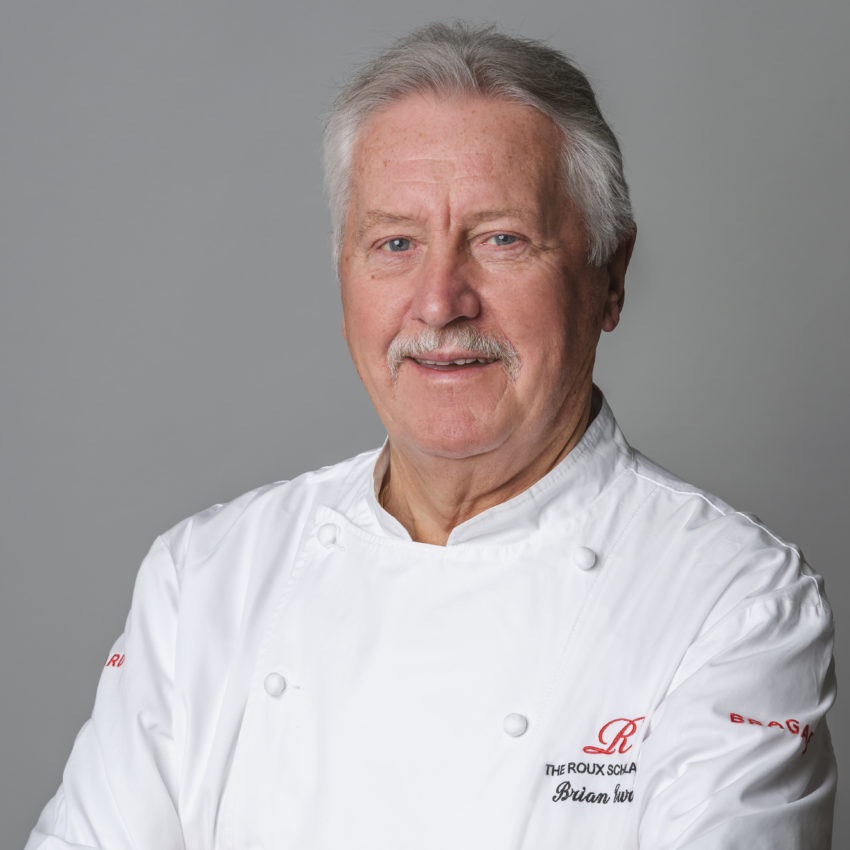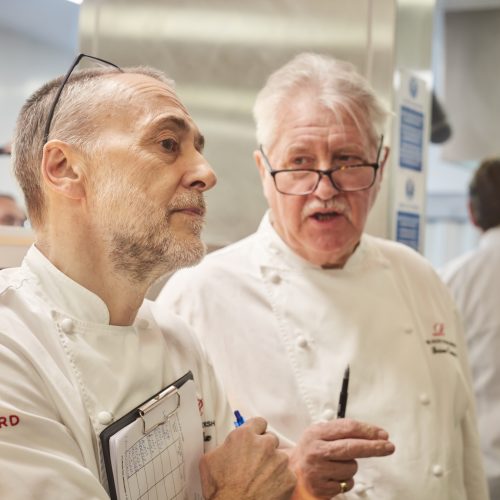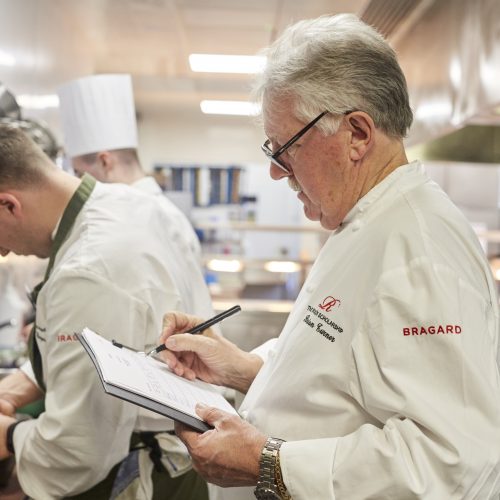Vice-Chairman
Brian Turner CBE
“All things that are being built for the future must be built on solid foundations; the classics of cooking are based on these solid foundations and must never be forgotten. This I believe is fundamental to the sustainability of our industry.”

Brian Turner is one of Britain’s most well-known chefs, a regular on TV and radio with decades of experience running restaurants. He is our longest serving judge, having joined the panel in 1990.
His first taste of working in hospitality was helping out at his father’s transport café after World War II, where he served bacon butties and fry-ups. He then went on to study domestic science and was the only boy in the class. After finishing school, he moved to London from his native Yorkshire and started at Simpson’s in the Strand as a pot-washer, before rising through the ranks there, and in the kitchens of The Savoy, The Beau Rivage in Lausanne and Claridge’s.
In 1971, at the age of 25, Brian opened the kitchens of The Capital Hotel with Richard Shepherd where they won a then- rare Michelin star. Among the chefs who worked with Brian at the Capital were Gary Rhodes and Shaun Hill. During this time, he also launched the Greenhouse Restaurant and the Metro Wine Bar.
In 1986, he opened his own restaurant Turner’s in Walton Street, Chelsea. After fifteen years of success he opened restaurants in Birmingham and Slough and in 2003 at The Millennium Hotel in Grosvenor Square, Mayfair. Most recently, he had Turner’s in Butlins, Bognor Regis, which closed in 2017.
Brian is the former President of the Royal Academy of Culinary Arts which he combined with a successful career as a TV personality. Having been on the first ever Ready Steady Cook Show, Brian served 14 and a half years on the very successful programme as well as many appearances on This Morning and Saturday Kitchen and Saturday with James Martin. In 2014, he had his own show ‘A Taste of Britain’ on the BBC, followed the year after with another BBC show My Life on a Plate, both shows are regularly repeated on TV. He is the author of a number of books covering British recipes and classic dishes.
Brian has always been dedicated to the training and development of young chefs, and in the Queen’s birthday honours list in 2002, he was awarded a CBE for his services to tourism and training in the catering industry. Since then Brian has been made an Honorary Professor of The University of West London, a Fellow of the City and Guilds of London Institute as well as receiving Honorary Doctorates of Science at Leeds Metropolitan and Sheffield Hallam Universities. Brian has received an Honorary Apprenticeship Award, which he feels complements his work with the Adopt a School scheme and the Future chef competition which both encourage young people to come into the catering industry.
Brian has been Vice Chairman of the Roux Scholarship since 2010, bringing his talent and experience to the judging panel in their searches for the winners of the Roux Scholarship. As President of the UK’s team for the Bocuse d’Or for 29 years (until 2019), and a regular on other judging, panels, Brian is delighted to bring his experience to the Roux Scholarship judging panel.



How has the British restaurant scene evolved since you began your career?
This last 50 years has seen a marvellous growth in the British restaurant scene, producing some brilliant young British chefs and some wonderful restaurants in which to dine. At the beginning, the UK did not have the best of reputations, but thanks to inspiration and experience supplied by European chefs and an increase in the quality and funding of training, things have moved on marvellously. Much of this inspiration came particularly from French chefs working in London and especially from masters such as the Roux Brothers. The creation of the Roux Scholarship has been a wonderful stepping stone, moving the industry forward for so many of these young British chefs, which is exactly how it was envisaged more than 30 years ago.
Why is it an exciting time for British produce?
Another great factor in the journey of Britain on the world’s culinary map has been the development and perfecting of the relationship between farmers and chefs. Once upon a time, we had to go to Europe to get good produce, but over the years the talk between what chefs need and what farmers on could produce has just magnified. Chefs need great cared-for produce and animals, and now we have them.
How do you spot a talented chef in the early stages of their career?
It’s always satisfying to travel the world, visiting kitchens in hotels and restaurants and the colleges that provide further training; it’s where we see young people destined to have a great future. Just watching the enthusiasm and dedication of young people who, when you speak to them, have just the right attitude one needs to be a great chef. It’s an attitude of perseverance, of energy; alongside that they have the ability to cook food that is tasty both to the eye and more importantly to the palate.
What do you enjoy about judging the Roux Scholarship?
I love the camaraderie of both judges and competitors, and to know you’re instrumental in helping young chefs shape their future is truly heart-warming.
What advice would you give applicants?
My advice to applicants would be not to try to produce food that is too complicated. Get the support of your head chef and seniors, particularly while you do trial tastings, which you must do; remember taste is crucial. And finally, if you get to the regional finals, please ensure you bring all the right equipment and that you look the part: that of a professional trained chef.
How can taking part in The Roux Scholarship help a young chef's career?
The Roux Scholarship is a great opportunity to network among your peers, talking to other young people and watching how they work and present their food, especially the successful candidates. Taking part in the Scholarship also makes you focus your mind on the chosen product, whilst taking you out of your routine for a brief moment in life.
How do employers/kitchen brigades benefit from entering their chefs?
Good Roux Scholarship regional final candidates come back from the competition full of enthusiasm and hopefully new ideas, which can be passed on to the rest of the brigade.
Why is it important to learn and master the classic cooking techniques?
All things that are being built for the future must be built on solid foundations; the classics of cooking are based on these solid foundations and must never be forgotten. This I believe is fundamental to the sustainability of our industry.
What have YOU learned thanks to being a judge?
I have learned that we have fantastic produce and wonderful cooking talent in this country, which is improving all the time. Long may it continue!